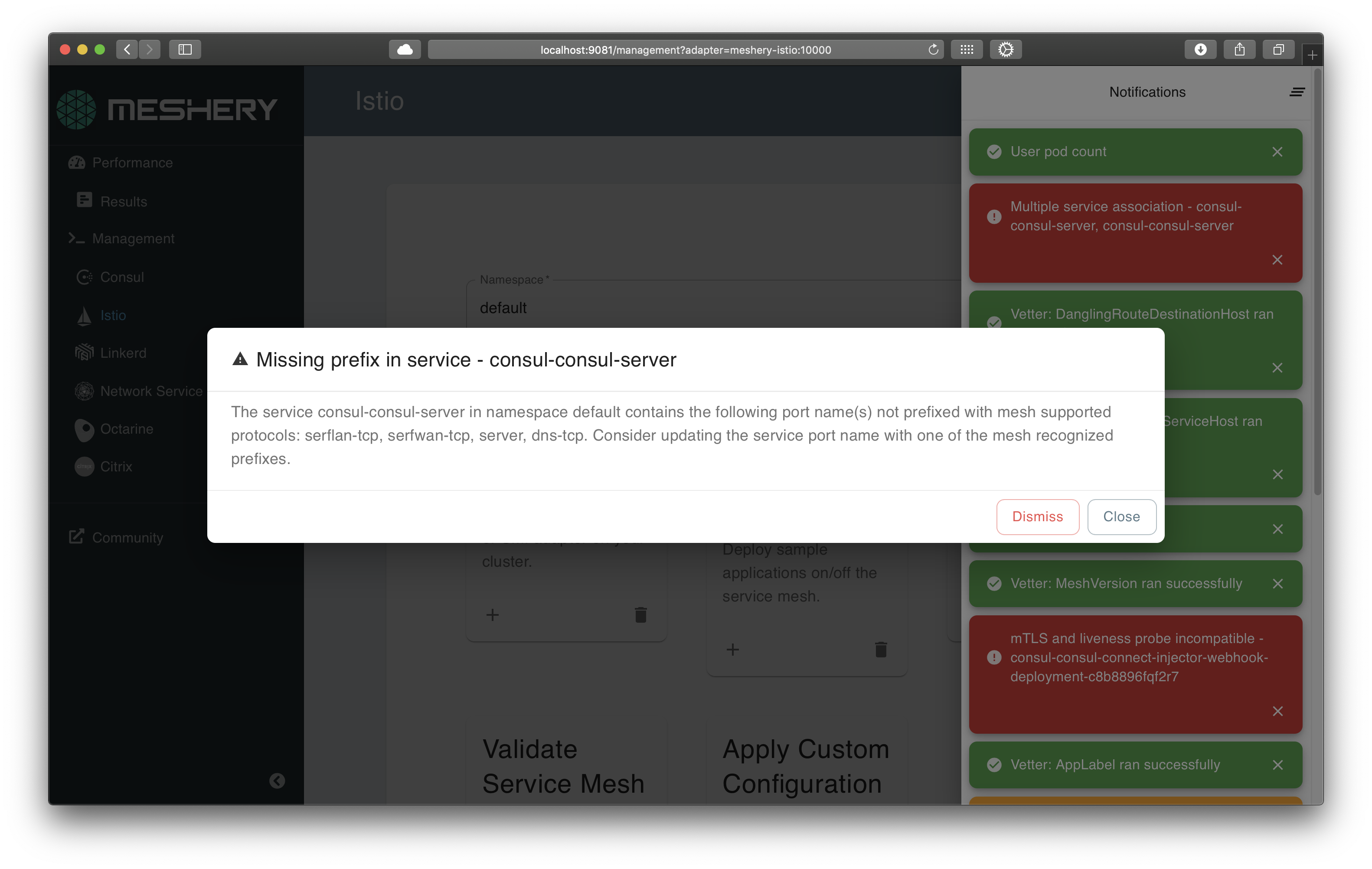Overview
As the service mesh management plane, Meshery enables the adoption, operation, and management of any service mesh and their workloads. Meshery’s powerful performance management functionality is accomplished through implementation of Service Mesh Performance (SMP). Meshery’s multi-mesh management functionality leverages Service Mesh Interface (SMI) and Meshery is the conformance tool for SMI. Meshery integrates with Open Application Model (OAM) to enable users to deploy service mesh patterns. Meshery enables operators to deploy WebAssembly filters to Envoy-based data planes. Meshery facilitates learning about functionality and performance of service meshes and incorporates the collection and display of metrics from applications running on or across service meshes.
Meshery’s Functionality
Meshery features can be categorized by:
- Service Mesh Performance Management
- Workload and service mesh performance characterization
- Prometheus and Grafana integration
- Service Mesh Configuration Management
- Configuration best practices
- Service Mesh Lifecycle Management
- Service mesh provisioning and workload onboarding
- Meshery Operator and MeshSync
- Service mesh patterns and Open Application Model integration
- Data Plane Intelligence
- Registry and configuration of WebAssembly filters for Envoy
- Service Mesh Interoperability and Federation
- Manage multiple service meshes concurrently
- Connect to multiple clusters independently
Meshery is for Developers, Operators, and Product Owners
Whether making a Day 0 adoption choice or maintaining a Day 2 deployment, Meshery has useful capabilities in either circumstance. Targeted audience for Meshery project would be any technology operators that leverage service mesh in their ecosystem; this includes developers, devops engineers, decision makers, architects, and organizations that rely on microservices platform.
Meshery is for service mesh patterns
Meshery integrates with Open Application Model (OAM) to enable users to deploy service mesh patterns.
Meshery is for performance management
Meshery helps users weigh the value of their service mesh deployment against the overhead incurred in running a service mesh. Meshery provides statistical analysis of the request latency and throughput seen across various permutations of your workload, infrastructure and service mesh configuration. In addition to request latency and throughput, Meshery also tracks memory and CPU overhead in of the nodes in your cluster. Measure your data plane and control plane against different sets of workloads and infrastructures.
Anytime performance questions are to be answered, they are subjective to the specific workload and infrastructure used for measurement. Given this challenge, the Envoy project, for example, refuses to publish performance data because such tests can be:
- Involved
- Misinterpreted
Beyond the need for performance and overhead data under a permutation of different workloads (applications) and types and sizes of infrastructure resources, the need for cross-project, apple-to-apple comparisons are also desired in order to facilitate a comparison of behavioral differences between service meshes and selection of their use. Individual projects shy from publishing test results of other, competing service meshes. An independent, unbiased, credible analysis is needed.
Meshery is intended to be a vendor and project-neutral utility for uniformly benchmarking the performance of service meshes. Between service mesh and proxy projects (and surprisingly, within a single project), a number of different tools and results exist. Meshery allows you to pick an efficient set of tools for your ecosystem by providing performance evaluation and metrics.
- By leveraging Meshery you could achieve apples-to-apples performance comparison of service meshes
- Track your service mesh performance from release to release.
- Understand behavioral differences between service meshes.
- Track your application performance from version to version.
 Establish a performance benchmark and track performance against this baseline as your environment changes over time.
Establish a performance benchmark and track performance against this baseline as your environment changes over time.
Meshery is for any service mesh
Infrastructure diversity is a reality for any enterprise. Whether you’re running a single service mesh or multiple types of service meshes, you’ll find that Meshery supports your infrastructure diversity (or lack thereof).
Supported Service Meshes
Stable
| Service Mesh | Status |
|---|---|
 Meshery Adapter for Cilium Service Mesh Meshery Adapter for Cilium Service Mesh |
stable |
 Meshery Adapter for Consul Meshery Adapter for Consul |
stable |
 Meshery Adapter for Istio Meshery Adapter for Istio |
stable |
 Meshery Adapter for Kuma Meshery Adapter for Kuma |
stable |
 Meshery Adapter for Linkerd Meshery Adapter for Linkerd |
stable |
 Meshery Adapter for NGINX Service Mesh Meshery Adapter for NGINX Service Mesh |
stable |
 Meshery Adapter for Network Service Mesh Meshery Adapter for Network Service Mesh |
stable |
 Meshery Adapter for Open Service Mesh Meshery Adapter for Open Service Mesh |
stable |
 Meshery Adapter for Traefik Mesh Meshery Adapter for Traefik Mesh |
stable |
Beta
| Service Mesh | Status |
|---|---|
 Meshery Adapter for App Mesh Meshery Adapter for App Mesh |
beta |
 Meshery Adapter for Citrix Service Mesh Meshery Adapter for Citrix Service Mesh |
beta |
Alpha - Service mesh adapters for which we are seeking community-contributed support.
| Service Mesh | Status |
|---|---|
 Meshery Adapter for Tanzu Service Mesh Meshery Adapter for Tanzu Service Mesh |
alpha |